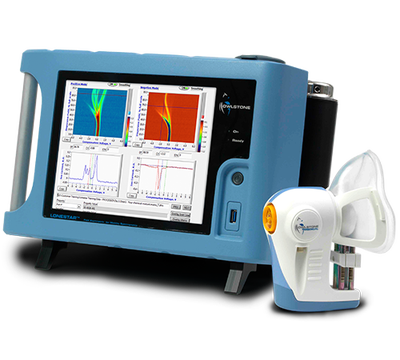February 8, 2017
Owlstone Medical has launched a 1,400-patient breath-based test using its microchip FAIMS technology to detect early-stage colorectal cancer.
Amanda Pedersen

Owlstone Medical's FAIMS platform is designed to detect disease biomarkers in breath
Two years ago, Bill Boyle lost his wife to colorectal cancer because she was diagnosed too late. Now his company is trying to develop a new way to detect colorectal cancer, using a microchip-based technology in the form of a breathalyzer test.
"A combination of low compliance and low sensitivity of current tests means too many patients are diagnosed when the cancer is at an advanced stage and survival chances are very poor," said Boyle, co-founder and CEO of Owlstone Medical.
The Cambridge, England-based company just launched a 1,400-patient breath-based study using its microchip Field Asymmetric Ion Mobility Spectrometer (FAIMS) technology to detect bowel cancer.
The InTERCEPT trial is designed to evaluate the accuracy of Owlstone's test in the detection of early-stage colorectal cancer when patient survival rates are at their highest.
Owlstone is running the trial in collaboration with the University of Warwick, the University Hospital Coventry, and Warwickshire NHS Trust.
"Early detection is our greatest opportunity for saving lives when chances of survival are higher than 90%," Boyle said. "Through our InTERCEPT trial we hope to make this a reality for more patients."
A pilot study using the technology showed the a sensitivity of 88% in detecting volatile organic compound (VOC) biomarkers for colorectal cancer. The pilot study also showed a sensitivity of 62% for detection of advanced adenomas, a pre-cancerous stage of colorectal cancer, representing a substantial increase in the rate of detection compared with the fecal occult blood tests based on detecting blood in feces that are used currently within the NHS bowel cancer screening program.
The InTERCEPT trial is being run in collaboration with the University of Warwick, the University Hospital Coventry, and Warwickshire NHS Trust with consultant gastroenterologist Ramesh Arasaradnam as principal investigator.
Owlstone said the work has received widespread support from research organizations and charities.
Amanda Pedersen is Qmed's news editor. Contact her at [email protected].
[Image credit: Owlstone Medical]
About the Author(s)
You May Also Like


